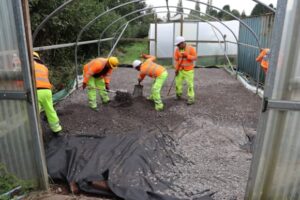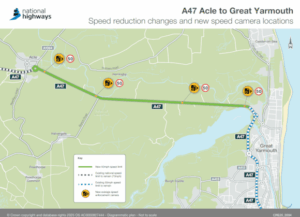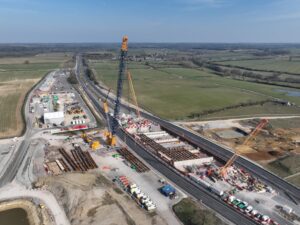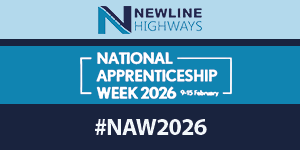A new footbridge has marked the next phase of the Lower Otter Restoration Project in Devon.
Significant progress has been made on preparing and consolidating the new raised and flood-free route of South Farm Road ready for construction, the building of a road bridge under which tidal waters will flow, and the lowering of Big and Little Banks at the north of the scheme. As a result, the project now turns its attention to the very southern end of the site, preparing the way for the re-connection of the historic floodplain with the Otter River and its estuary via a breach in the existing earth embankment.
To ensure continuity of the popular and nationally important South West Coast Path, a 70-metre footbridge will be constructed in the location of the future breach. This will provide a more accessible, and all-season route through the raising of the 900-metre-long footpath on the western edge of the valley, which runs from the entrance of the current Budleigh Salterton Cricket Club on Granary Lane to South Farm Road.
While the footbridge works are underway, there will be a temporary diversion in place of a short section of the footpath from 15 September 2022 until the completion of the breach in spring/summer 2023.
Starting work the same week after completing its final season, the nearby Budleigh Salterton Cricket Club will be relocated to its new home at an already constructed and purpose-built pitch. This is a more sustainable location that will provide improved facilities and is no longer subject to flooding. This means the existing clubhouse will be demolished and some surrounding vegetation within the floodplain removed by a specialist team of arboriculturists. Any trees lost will be replaced as part of the project’s mitigation planting programme. This work will enable the creation of over 50 hectares of rare wildlife-rich saltmarsh and mudflat.
Dan Boswell of the Environment Agency said: “Thanks to the continued support and patience of the local community and visitors to the Lower Otter, our work to reconnect the estuary to its historic floodplain for the benefit of birds, biodiversity and people is starting to take shape. The South West Coast Path and the cricket club mean a great deal to the community, and so it is important to us and the project that the project supports their future and helps them adapt to sea level rise.”
The temporary diversion of the footpath will allow users to continue to enjoy the area safely with as little disruption as possible. The new footbridge and improved footpath will mean visitors will be able to take in better views all year round of the surrounding natural habitats and diverse wildlife that will be attracted to the restored wetlands. The new home of the relocated cricket club will not only safeguard it too from the risks of flooding, but will also allow for an even greater range of community amenities and activities.
The Lower Otter Restoration Project is an intertidal habitat creation project delivered by the Environment Agency in partnership with the East Devon Pebblebed Heaths Conservation Trust and Clinton Devon Estates.
It is part of a cross-border initiative called ‘Promoting Adaptation to Changing Coasts’ (PACCo) where we are working with partners in the Saâne Valley in Normandy (France) to share learning on the delivery of climate change adaptation projects.
The Lower Otter Restoration Project has been majority funded by the UK government, with £8.5 million of co-financing from the European Regional Development Fund (ERDF), through the Interreg V A France (Channel) England programme (2021 to 2023).























